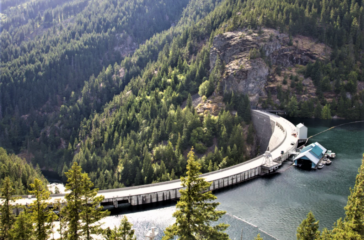A fight for river salmon and the “rights of nature”
A battle for the “rights of nature” is underway in Washington state, as an Indian tribe takes on Seattle over allegations that decades-old hydroelectric dams are contributing to declining salmon populations.
The Sauk-Suiattle Indian Tribe is scheduled to present its case on Tuesday to the Sauk-Suiattle Tribal Court, asking for an affirmation of tribal jurisdiction to hear the litigation. Lawyers representing Seattle are expected to argue that the court lacks jurisdiction beyond the boundaries of the 48-acre Sauk-Suiattle tribal reservation, which lies 80 miles northeast of Seattle.
The dams at issue, the tribe says, are threatening the viability of the salmon species and steelhead trout that spawn in the upper reaches of the Skagit River, a 150-mile waterway draining a watershed in the Cascade Mountains.
The tribe alleges that Seattle violated tribal property rights granted in an 1855 treaty “by unilaterally constructing dams without official notice,” along the waterway.
In its civil complaint, the tribe asks the court to declare that the fish in question possess “inherent rights to exist, flourish, regenerate, and evolve,” including rights to “pure water,” the right to a healthy climate system, and a natural environment free from human-caused global warming impacts. . . .” The salmon have lost spawning and rearing habitat due to the dams, the complaint alleges.
 EWG
EWG